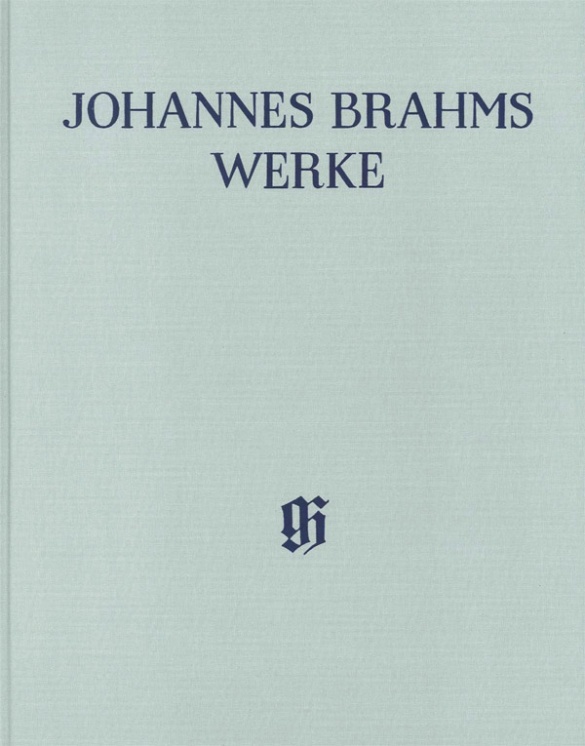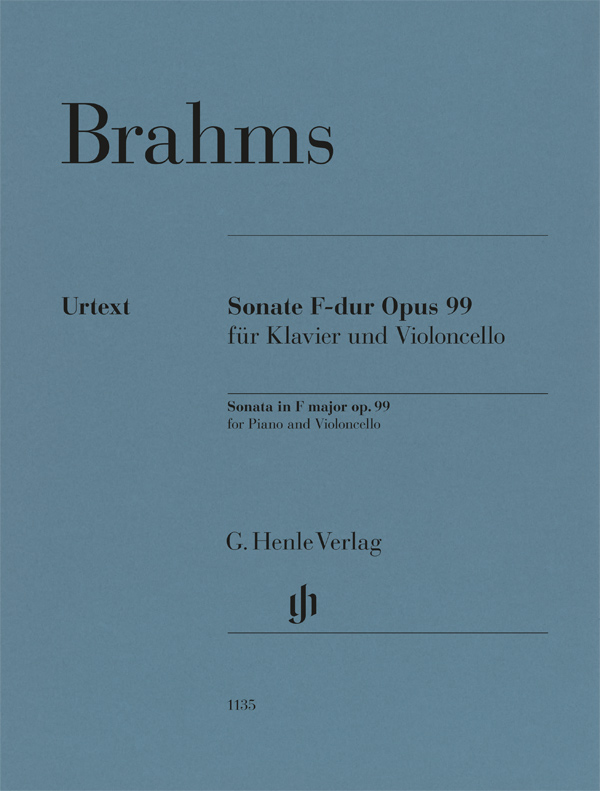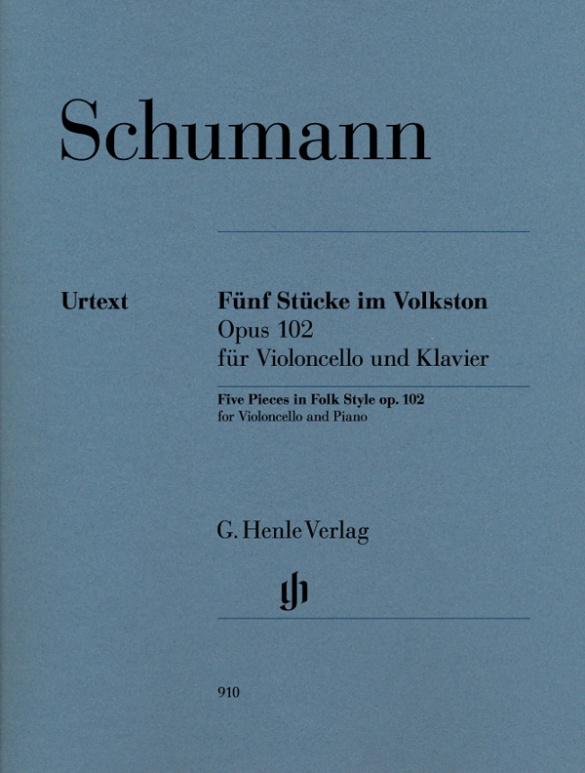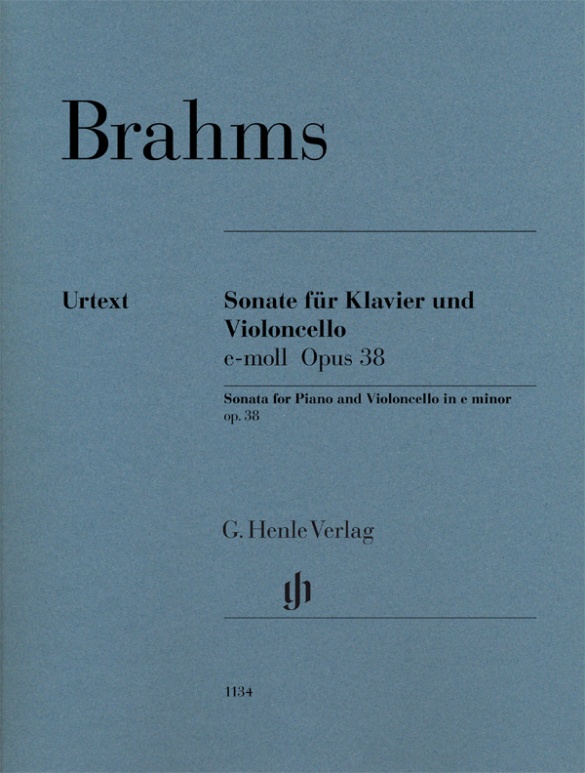

Johannes Brahms
Violoncello Sonata e minor op. 38
The e minor Cello Sonata is the first work for one solo instrument and piano which the meticulous composer also had printed. In summer 1865 Brahms offered it to the publisher Simrock as a sonata “whose two instruments are both absolutely easy to play” – and rightly so: contrary to the later F-major Sonata op. 99 (HN 1135), this early sonata is technically less demanding, yet musically more striking at the same time, so that it is a hit with amateurs and professionals alike. Our new edition is based on the new Brahms Complete Edition and thus boasts, besides in-depth comments, a musical text revised according to the latest scholarly findings; as always, the cello part is enhanced with additional markings.
Content/Details
(Explanation)
Exclusively in the Henle Library APP
Fingerings by: Hugo Becker, David Geringas, Hans Münch-Holland, Leonard Rose, Janos Starker
About the Composer

Johannes Brahms
His significant output comprises chamber music, piano works, numerous choral compositions and songs (including settings of folk-song lyrics), as well as large-scale orchestral works in the 1870s and 1880s. His compositions are characterized by the process of developing variation. He is considered an antithesis to the New German School around Liszt, and an advocate of “absolute” music.
| 1833 | Born in Hamburg on May 7, the son of a musician. His first piano instruction with Willibald Cossel at age seven, then with Eduard Marxen; first public performances from 1843. |
| 1853 | Concert tour through German cities; he meets Schumann, who announces him as the next great composer in his essay “Neue Bahnen” (“New Paths”). A lifelong, intimate friendship develops with Clara Schumann. |
| 1854–57 | Piano Concerto No. 1 in D minor, Op. 15. |
| 1857–59 | Choir director, pianist, and teacher at the royal court in Detmold. |
| 1859–61 | Director of the Hamburg Women’s Choir. |
| 1860 | Manifesto against the New Germans around Liszt. |
| 1863 | Cantata “Rinaldo,” Op. 50. |
| 1863–64 | Director of the Wiener Singakademie. |
| 1868 | Partial performance in Vienna of “A German Requiem,” Op. 45 (the complete work premiered in Leipzig in 1869) |
| 1871–74 | Artistic director of the Gesellschaft der Musikfreunde (Society of Friends of Music) in Vienna. |
| 1873 | Haydn Variations, Op. 56a, for orchestra. |
| from 1877 | His symphonic output begins with the Symphony No. 1 in C minor, Op. 68 (begun 1862); composition of the Symphony No. 2 in D major, Op. 73; the Symphony No. 3 in F major, Op. 90 (1883); and Symphony No. 4 in E minor, Op. 98 (1884–85): cantabile themes, chamber-music-like style. |
| from 1878 | Travels in Italy. |
| 1878 | Violin Concerto in D major, Op. 77, for Joseph Joachim. |
| 1881 | Piano Concerto No. 2 in B-flat major, Op. 83, with a scherzo movement. |
| 1886 | Honorary president of Vienna’s Tonkünstlerverein (Association of Musicians). |
| 1897 | Four Serious Songs, Op. 121. Dies in Vienna on April 3. |
About the Authors
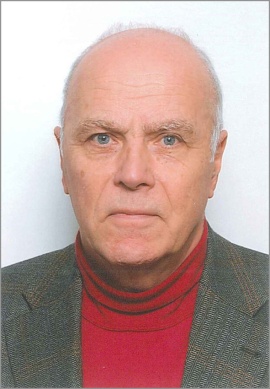
Egon Voss (Editor)
Dr. Egon Voss, born in 1938 in Magdeburg, did a secondary school teaching degree in Detmold (Staatsexamen in 1961) and studied German, philosophy and pedagogy in Kiel and Münster (Staatsexamen 1964). He subsequently studied musicology in Cologne, Kiel and Saarbrücken and completed his doctorate in 1968.
In 1969 Voss became a scholar at the Richard Wagner Complete Edition in Munich, since 1981 he has been its Head. From 1989 to 1990 he was the dramaturg at the Théȃtre la Monnaie/de Munt Brüssel, and from 1996 to 2002 a lecturer at the post-graduate programme “Textkritik” at the Ludwig-Maximilians-Universität in Munich. Voss is a member of the advisory board for the edition “Richard Wagner, Sämtliche Briefe” as well as the journals “wagnerspectrum” and “The Wagner Journal”. He has published several books and a great many essays on Wagner, Schumann, Bach and other composers and musicological topics.

Klaus Schilde (Fingering Piano)
Prof. Klaus Schilde, born in 1926, spent his childhood in Dresden. There he was greatly influenced by Walter Engel, who taught him the piano (Kodaly method), composition and violin. From 1946–1948 he studied at the music conservatory in Leipzig with Hugo Steurer. After moving to the west in 1952 he studied with Walter Gieseking and Edwin Fischer, as well as with Marguerite Long, Lucette Descaves and Nadia Boulanger in Paris.
Schilde won numerous prizes. From 1947 onwards he gave concerts as a soloist and chamber musician on almost every single continent with renowned orchestras. He taught at the music conservatories in East Berlin Detmold, West Berlin, Munich, Tokyo (Geidai) and Weimar. From 1988–1991 he was President of the Staatliche Hochschule für Musik und Theater in Munich, where he also taught for decades as a professor. There are numerous radio and television broadcasts with Klaus Schilde as well as CD recordings. Schilde has contributed fingerings to almost 100 Henle Urtext editions.
Prof. Klaus Schilde passed away on 10 December, 2020.
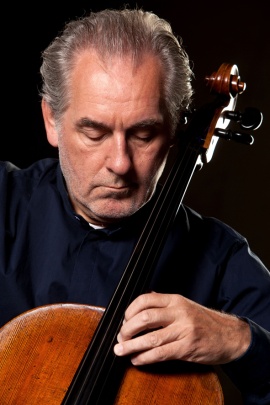
Claus Kanngiesser (Fingering and bowing for Violoncello)
Product Safety Informations (GPSR)

G. Henle Verlag
Here you can find the information about the manufacturer of the product.G. Henle Verlag e.K.
Forstenrieder Allee 122
81476 München
Germany
info@henle.de
www.henle.com
This recent scholarly publication provides a well-researched historical background to this popular sonata. (...) Details of the various sources on which the edition is based, and individual comments about specific changes in the score are provided. Typically, the edition is beautifully presented, with excellent layout and spacing.
AUSTA Stringendo, 2016Selbstverständlich sind auch hier gute Lesbarkeit, gute Wendestellen und ein verlässlicher Notentext (der auf der neuen Brahms-Werkausgabe fußt). (...) Eine Neuedition, die höchsten Ansprüchen genügt (...) und nachdrücklich empfohlen sei!
ESTA-Nachrichten, 2016Questa volta la grande casa editrice di Monaco di Baviera provvede a corredare la pubblicazione di un'esaustiva introduzione critica a cura di Johannes Behr e di una parte violoncellistica revisionata da Klaus Kanngiesser. Revisione, quest'ultima, che riteniamo molto interessante per il fatto di rappresentare un coraggioso tentativo di ripulitura dalle incrostazioni della cosiddetta "tradizione". (...) Rispetto alle sia pur validissime soluzioni di Klengel, queste di Kanngiesser, tuttavia, aprono degli spiragli nuovi, specialmente laddove le soluzioni tecniche proposte sono ideate per rendere giustizia alle sottigliezze agogiche della scrittura brahmsiana.
Archi Magazine, 2015recommendations
autogenerated_cross_selling
Further editions of this title


